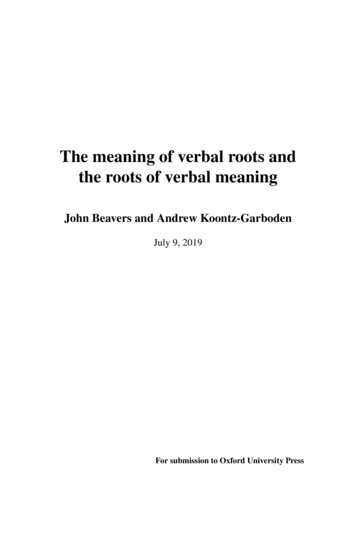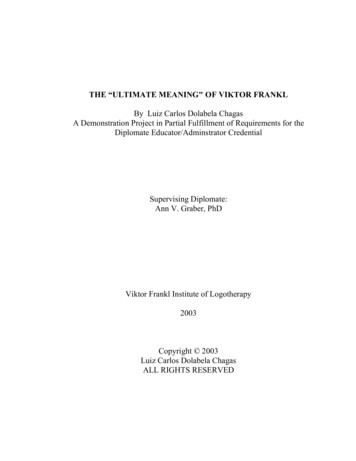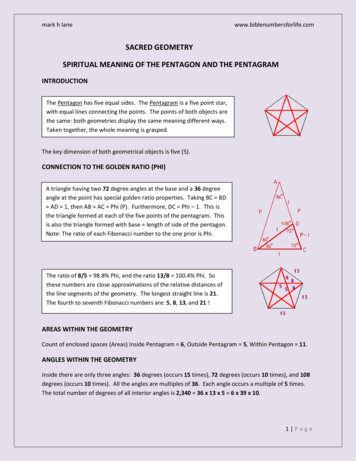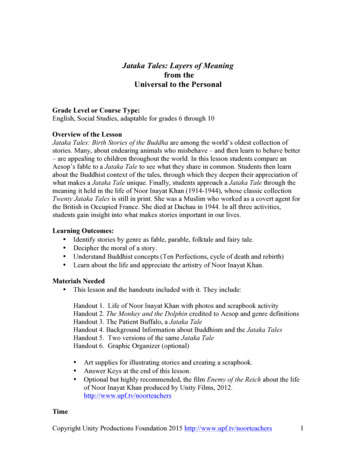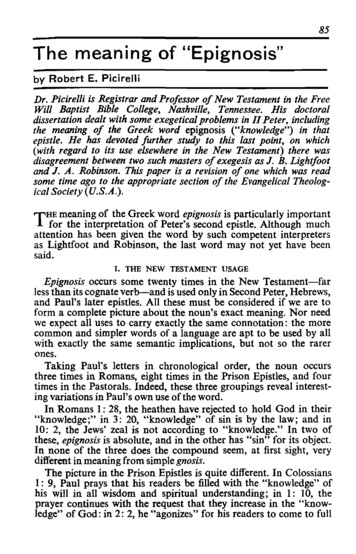
Transcription
85. The meaning of "Epignosis"by Robert E. PicirelliDr. Picirelli is Registrar and Professor of New Testament in the FreeWill Baptist Bible College, Nashville, Tennessee. His doctoraldissertation dealt with some exegetical problems in 11 Peter, includingthe meaning of the Greek word epignosis ("knowledge") in thatepistle. He has devoted further study to this last point, on which(with regard to its use elsewhere in the New Testament) there wasdisagreement between two such masters of exegesis as J. B. Lightfootand J. A. Robinson. This paper is a revision of one which was readsome time ago to the appropriate section of the Evangelical Theological Society (U.S.A.).of the Greek word epignosis is particularly importantT formeaningthe interpretation of Peter's second epistle. Although muchHEattention has been given the word by such competent interpretersas Lightfoot and Robinson, the last word may not yet have beensaid.I. THE NEW TESTAMENT USAGEEpignosis occurs some twenty times in the New Testament-farless than its cognate verb-and is used only in Second Peter, Hebrews,and Paul's later epistles. All these must be considered if we are toform a complete picture about the noun's exact meaning. Nor needwe expect all uses to carry exactly the same connotation: the morecommon and simpler words of a language are apt to be used by allwith exactly the same semantic implications, but not so the rarerones.Taking Paul's letters in chronological order, the noun occursthree times in Romans, eight times in the Prison Epistles, and fourtimes in the Pastorals. Indeed, these three groupings reveal interesting variations in Paul's own use of the word.In Romans 1: 28, the heathen have rejected to hold God in their"knowledge;" in 3: 20, "knowledge" of sin is by the law; and in10: 2, the Jews' zeal is not according to "knowledge." In two ofthese, epignosis is absolute, and in the other has "sin" for its object.In none of the three does the compound seem, at first sight, verydifferent in meaning from simple gnosis.The picture in the Prison Epistles is quite different. In Colossians1: 9, Paul prays that his readers be filled with the "knowledge" ofhis will in all wisdom and spiritual understanding; in 1: 10, theprayer continues with the request that they increase in the "knowledge" of God: in 2: 2, he "agonize!." for his readers to come to full
86The Evangelical Quarterlyunderstanding of the "knowledge "of the mystery of God; and in3: 10, the readers are said to have put on the new man who is renewedin "knowledge." In Ephesians 1: 17, Paul prays that his readers begranted a spirit of wisdom and revelation in the "knowledge" ofGod; and in 4: 23 he desires to build up the church to a unity of thefaith and the "knowledge" of the Son of God. In Philemon 6, Pauldesires that Philemon have "knowledge" of every good thing inChrist. In Philippians 1: 9, his prayer is for love to abound in all"knowledge" and perception. We note that epignosis, in theseplaces, is almost invariably associated with such words as wisdom,understanding, and perception; and with a prayer that the readerabound, be filled, increase, be built up, or be effectual in this particular quality. In these passages, the object of epignosis is God,God's will, the mystery of God, the Son of God, or "every good thingin Christ."The scene changes again when we examine the Pastorals. In 1Timothy 2: 4, God desires all men to be saved and come to the"knowledge" of the truth. In 2 Timothy 2: 25, God may grant repentance unto the "knowledge" of the truth; and in 3: 7, the falseteachers ever learn but never come to the "knowledge" of thetruth. In Titus 1: ], Paul is a servant according to the faith of God'select and the "knowledge" of the truth. We cannot miss the fact thatepignosis, in all four of these occurrences, has "truth" for its objectand that all four passages associate the word closely with theconversion event itself. For the sake of convenience, we may putthe one occurrence in Hebrews (10: 26) in this same group, sincethere too we have the "knowledge" of the truth intimately associatedwith conversion.And now to Second Peter, where epignosis is certainly one of thekey words. It occurs first in I : 2, where Peter prays that grace andpeace be multiplied to his readers in the "knowledge" of God; thenin 1: 3, where Christ has freely granted all the things necessary forspiritual life and piety through the "knowledge" of Him who calledus; next in 1 : 8, where we are taught how to avoid being barren orunfruitful in respect to the "knowledge" of Christ; and finallyin 2: 20, where reference is made to those who escaped the defilements of the world by means of the "knowledge" of Christ. All fourof these have God or Christ for the object of this knowledge, andall seem-at least at first sight-to be looking back to the conversionexperience.11. THE DEBATE OF THE INTERPRETERSThe main question that must be decided, if one is to be sure aboutthe exact meaning of epignosis in all these passages, is whether thereis any difference between the compound word and the simple
The meaning of "Epignosis"87gnosis. If so, what is that difference, and what is the exact force ofthe compound?A. Conflicting opinionsThere are very few commentators, if any, who think that epignosisis never different from gnosis. Bultmann appears to take such aposition, although the following words of his will be qualified later:It is, however, impossible to say that there is any difference betweengnosis and epignosis, either in N.T. or LXX . The compound noun atRom. i. 28 corresponds to the simple verb at ver. 21. There is no difference ofmeaning between the compound noun at Phi\' i. 9 and the simple at 1 Cor.i. 5; Rom. xv. 14.1Some feel certain there is a difference, but want to guard againstover-statement of that difference. Alford, for example, believes thatepignosis means "mature knowledge," but adds that it "can hardlybe given in English without too strong a phrase."2 Plummer, alongthe same line, suggests that epignosis implies a "fuller, riper, moreminute knowledge;" but, he says, "any of these expressions wouldbe a little too strong, as the simple word is a little too weak."3Others are not so hesitant, and give great emphasis to the difference. Lenski, for example: "There may be a false gnosis, but nevera false epignosis. The latter is a true, clear, full knowledge that ispersonally embraced." 4 Strachan is on this same side:Epignosis contrasted with gnosis marks "a higher degree of intensity, anenergy of deeper penetration. It is not a quiescent state, the resting in anacquirement, but the advance of one to whom easy attainment is but theimpulse of fresh effort; one who is not content to know, but ever, in Hosea'swords (vi. 3), follows on to know" (Paget, Spirit of Discipline, p. 112).5B. Lightfoot's viewWhen differences are asserted to exist between epignosis andgnosis, opinions vary considerably as to the nature of those differences. Probably the most widely influential position is that ofJ. B. Lightfoot, who deals with epignosis in his discussion of Coloss12345Rudolf Bultmann, "Gnosis" (Volume H, book n of Bible Key Words, fromGerhard Kittel's Theologisches WorterbuchZum Neuen Testament, trans. fromGerman first edition and edited by J. R. Coates (New York: Harper &Brothers, Publishers, 1958), p. 38.Henry Alford, The Greek Testament, fourth edition (London, Oxford, &Cambridge: Rivingtons, 1871), IV, 390.Alfred Plummer, "The Second Epistle of St. Peter," A Bible Commentaryfor English Readers, Charles Ellicott, editor (London: Cassell & Company,Ltd., n.d.), VIII,444.R. C. H. Lenski, The Interpretation of the Epistles of St. Peter, St. John andSt. Jude (Columbus: The Wartburg Press, 1945), p. 253.R. H. Strachan, "The Second Epistle General of Peter," The Expositor'sGreek Testament, W. Robertson Nicoll, editor (Grand Rapids: Wm.B.Eerdmans, 1951), V, 127.
88The Evangelical Quarterlyians 1: 9. Citing Chrysostom, Justin Martyr, and 1 Corinthians13: 12, he concludes:The compound epignosis is an advance upon gnosis, denoting a larger,more thorough knowledge . Hence also epignosis is used especially of theknowledge of God and of Christ, as being the perfection ofknowledge.6In referring to Philippians 1: 9, Lightfoot gives yet anotherreason for his view. There Paul prays "that love . may abound inknowledge (epignosis) and all perception." Lightfoot is convincedthat the preposition epi added to gnosis in this verse answers to theadjective "all" in front of "perception."7 Many commentatorsfollow Lightfoot, and usually refer to him without appearing to havegiven extensive consideration to the matter themselves. Sanday andHeadlam, for example, simply say (in reference to Romans 10: 2):"See Lightfoot on Col. i. 9, to whose note there is nothing to add."8C. The position of RobinsonSome interpreters maintain independence of Bishop Lightfoot.Bigg, for example, insists that the difference is more in what is knownthan how well it is known. Commenting on 2 Peter 1 : 2, he says:If we compare verso 5, 6, 8, there appears to be a difference intendedbetween gnosis and epignosis. The former, as in 1 Pet. iii. 7, appears todenote good sense, understanding, practical wisdom; the latter is used of theknowledge of Christ . But generally speaking, in the New Testament it isnot easy to keep gnosis and epignosis distinct.9The most important opposition to Lightfoot is furnished, however,by J. Armitage Robinson, who has devoted a thorough and detailedsection to epignosis in his commentary on Ephesians. He may beconsulted for a careful account of the use of the word in classicalGreek, the Septuagint, Polybius, and the New Testament. Hisanswers to Lightfoot's citations from Chrysostom and JustinMartyr are convincing, and his conclusions cannot be treatedlightly:. . . the simple verb would have given the meaning, intelligently if lessprecisely, in all the cases which we have cited. There is no indication thatepiginoskein conveys the idea of a fuller, more perfect, more advancedknowledge.We find a large number of compounds in epi, in which the prepositiondoes not in the least signify addition, but rather perhaps direction. It seemsto fix the verb upon a definite object . In these cases we cannot say that the6789J. B. Lightfoot, Saint Paul's Epistles to the Colossians and to Philemon(London: Macmillan & Company, Limited, 1927), p. 136.J. B. Lightfoot, Saint Paul's Epistle to the Philippians, fourth editionrevised (London: Macmillan & Company, Limited, 1908), p. 86.William Sanday and Arthur C. Headlam, A Critical and Exegetical Commentary on the Epistle to the Romans, fifth edition (in The International CriticalCommentary series; Edinburgh: T. & T. Clark, 1902), p. 283.Charles Bigg, A Critical and Exegetical Commentary on the Epistles 0/ St.Peter and St. Jude (in The International Critical Commentary series, secondedition; Edinburgh: T. &. T. Clark, 1902), pp. 253.
The meaning of "Epignosis"89compound verb is stronger than the simple verb. The preposition is notintensive, but directive (if the word may be allowed): It prepares us toexpect the limitation of the verb to a particular object.Thus ginoskein means "to know" in the fullest sense that can be given tothe word "knowledge": epiginoskein directs attention to some particularpoint in regard to which "knowledge" is affirmed. So that to perceive aparticular thing, or to perceive who a particular person is, may tidy beexpressed by epiginoskein. There is no such limitation about the wordginoskein, though of course it may be so limited by its context .So far then as we are able to distinguish between gnosis and epignosis, wemay say that gnosis is the wider word and expresses "knowledge" in thefullest sense: epignosis is knowledge directed towards a particular object,perceiving, discerning, recognizing: but it is not knowledge in the abstract:that is gnosis. It follows that the genitive after gnosis may be either subjectiveor objective: but the genitive after epignosis denotes the object of the knowledge.1 0Moulton and Milligan appear to be in support of Robinson'sview, and observe that his conclusions are "on the whole borne outby the evidence of the papyri." 11Ill. CONCLUSIONSThe following conclusions can now be drawn, and with reasonableconfidence, at least as far as this writer is concerned.1. Robinson's position is, in a general way, stronger than Lightfoot's. The bases for his conclusions are more firm, and the papyricitations of Moulton and Milligan lend support. His understandingof the force of the epi in this compound is both logical and in accordwith other epi compounds. The meaning he gives epignosis will fitthe word wherever it occurs: the epi is almost like a built-in arrow,an emphatic pointer in the direction of the object known. ButRobinson's view, while true as far as it goes, does not go far enough.Epignosis is much more specific, at least in many of its occurrences.2. No one explanation of the exact connotation of epignosis willcover all its uses in the New Testament. The survey, above, of Paul'svaried uses of the word ought to convince anyone that the semanticforce of the word will differ according to context. Have we notlearned about semantics, in our day, so that such variations will notsurprise us ?Robinson's interpretation of epignosis will apply to each occurrenceof the word, but it will not completely explain them all. Even acursory glance at a good lexicon will reveal that epignosis-likeother words-is used with a variety of meanings. Liddell and Scott,for example, list "recognition," "determination," "knowledge,""scientific theory," and "decision."1011J. Armitage Robinson, St. Paul's Epistle to the Ephesians (London: Macmillan & Company, Limited, 1903), pp. 249-254.J. H. MouIton and George Milligan, The Vocabulary of the Greek Testament(Grand Rapids: Wm. B. Eerdmans, 1949), p. 236.
90The Evangelical QuarterlyFor further confirmation of this variety, and for additional help inunderstanding epignosis, we ought to study the New Testamentusage of the cognate verb epiginosko. It appears forty-two times,although curiously not by any means with the same distribution asthe noun. Matthew uses it six times; Mark four; Luke and Actseighteen times. Paul uses it twelve times, with nine of these in1 and 2 Corinthians and one each in Romans, Colossians, and1 Timothy. Peter uses the word twice, both in 2 Peter 2: 21.These uses can be classified as follows: (1) to know someone orsomething for who or what he or it really is (Mt. 7: 16,20; 11: 27;14: 35; 17: 12; Mk. 6: 33, 54; Acts 12: 14; 27: 39; 28: 1; Cor. 13: 12).(2) to come to a realization or perception (inwardly) of something(Mk. 2: 8; 5: 30; Lk. 1: 4, 22; 5: 22; Acts 3: 11; 19: 34). (3) to learnor find out some (outward) fact (Lk. 7: 37; 23: 7; 24: 16,31; Acts9: 30; 22: 24, 29; 24: 8). (4) a realization or understanding that isalready in existence, much like simple gnosis (Acts 25: 10; Rom. 1 : 32;2 Cor. 13: 5). (5) to give ackowledgment to someone or something(Acts 4: 13; I Cor. 14: 37; 16: 18; 2 Cor. 1: 13, 14; 6: 9). (6) theequivalent of conversion (Col. 1: 6; 1 Tim. 4: 3). This classificationmay be somewhat over-simplified, and some of these verses mayneed further study; but the list will at least serve to demonstrate thevariety possible in the meanings of the word.3. There is some ground for giving epignosis an intensive force insome of its New Testament uses, though probably not so emphaticas given by Lightfoot and his followers. Indeed, Robinson himselfmay have made one point that would allow this; he quotes from thepassage cited from Justin Martyr by Lightfoot, and answers himthus:"Is there an episteme which affords a knowledge (gnosis) of the actualthings human and divine, and after that a knowledge (epignosis) of thedivineness and righteousness of these same things?" Here the distinction(if we are to press for one) is between a knowledge which reveals to us thethings themselves, and a knowledge which discerns certain qualities of thosethings.1JOne will quickly see that a "knowledge which discerns certainqualities" of things already known is, in fact, an advance in knowledge, a more perfect knowledge. Even so, it seems clear that sucha meaning for epignosis comes more from the context in which it isused than from the force of the epi. And Paul's uses of the wordin the Prison Epistles are the only ones where we can be sure itmeans mature knowledge, with an intensive or perfective force.Perhaps it is significant that Lightfoot's commentaries, in which he1213H. G. Liddell and R. Scott, A Greek-English Lexicon, revised by H. S. Jones(Oxford: The Clarendon Press, n.d.), 1,627.Robinson, op. cit., p. 252.
The meaning oj"Epignosis"91treated the meaning of epignosis, are written on the Prison Epistlesrather than on the Pastorals or Peter.4. There appears to be one very important factor involved in themeaning of epignosis which neither Lightfoot nor Robinson hascaught. This writer is convinced that the epi in epignosis has, often,an inceptive force, referring to the specific experience when one cameto the knowledge of some person or thing. If Lightfoot calls hisunderstanding of epi intensive, and Robinson calls his directive,we might call this ingressive or-still better-decisive.In other words epignosis would look to the particular crisisexperience when knowledge comes upon someone, when knowledgeenters. In this vein we could say that the simple gnosis would mostaptly represent a knowledge already existing, a state of being (a"linear" word, if you please). Then epignosis would represent apoint (a "punctiliar" word) at which one has the experience ofcoming to know.Several lines or argument can be used to support this conclusion.For one thing, epignosis is often used in direct connection with atemporal adverb, like "when" or "after." For another, we cancompare the uses of the cognate verb epiginosko, as classified above.In particular, note uses (2), (3), (5), and (6) in that list.Consider also that this is a logical understanding of epi, as wellas for its English equivalent "upon." "To come" is rather generaland unrestricted; "to come upon" marks a very specific point ofarrival. "To dawn" would be accurate enough; "to dawn upon"is even more pointedly decisive. In the same way, there is somethingquite specific and decisive about "knowledge-upon."Most important, consider that epi has this kind of effect in variouscompounds other than epignosis. ago means to bring or lead; epagomeans to "bring a thing on one." eimi is, simply, to be; epeimi is"to come upon, or arrive". Likewise, eperchomai is "to come to,to arrive." While erotao means to ask or inquire, eperotao means"to accost one with an inquiry, put a question to." If bareo meansto be heavy, epibareo means "to put a burden upon, to load." Andepibaino is "to get upon, mount," or "to go aboard (a ship)" or"set foot in, enter." Epiballo is "to throw one's self upon, rush upon,"and epiblepo means "to turn the eyes upon." These examples couldbe multiplied at great length. 14 (It is, perhaps, significant that mostof the occurrences of such epi-verbs as these are in the aorist tensein actual usage.)14All meanings quoted in this paragraph are from Joseph Henry ThayerA Greek-English Lexicon of the New Testament, fourth edition (Edinburgh:T. & T. Clark, 1901).
92The Evangelical QuarterlyIn other words, the placing of epi on the front of a word very often(perhaps more than with any other one result) makes a specificapplication of the word to a specific situation or circumstance. Inpart, this is what Robinson was shooting for when he saw the"directive" force of the preposition. And he was on the right track.But he failed to see that the fact of application may just as well bethe thing emphasized as the object to which the application is made.A better word than "directive" would have been "applicative."Thus epignosis often involves the particular crisis experience whenknowledg
Will Baptist Bible College, Nashville, Tennessee. His doctoral dissertation dealt with some exegetical problems in 11 Peter, including the meaning of the Greek word epignosis ("knowledge") in that epistle. He has devoted further study to this last point, on which (with regard
